New Mars Forums
You are not logged in.
- Topics: Active | Unanswered
Announcement
Pages: 1
#1 2018-09-02 17:51:26
- SpaceNut
- Administrator
- From: New Hampshire
- Registered: 2004-07-22
- Posts: 29,920
MARCO POLO/Mars Pathfinder
This topic should have been started along time ago....
It seems like this go put on the back burner:
In my opinion, NASA and JPL should proceed with the MARCO POLO project to test the ability to extract water from regolith for LOX/LCH4. If this is the lynch pin technology that makes surface exploration affordable, then this is what the next lander should test. It's an engineering technology demonstrator mission, rather than a science experiment, but also includes one science experiment to try to find life in the ground.
"Marco Polo" hum...do you mean key items not fully developed for a mars use... if so agreed.. we will know once moxie is sent for oxygen creation soon, the next as you indicate is getting water and or hydrogen to make fuel would be the next from insitu sources of materials and we do need a final answer on going solar only, going with nuclear only or going with a mix of solar and nuclear to allow for a backup for the energy needs....
MARCO POLO is a NASA ISPP experiment to produce LOX/LCH4 using Martian regolith and atmosphere.
http://kiss.caltech.edu/workshops/isru/ … anders.pdf
Mars ISRU: State-of-the-Art and System Level ConsiderationsMOXIE is just a SOXE and O2 liquefaction experiment. MARCO POLO is a complete ISPP plant.
Marco polo is just what it will be to get steady amounts from the unknown level of power to heat for the unknown water content from each shovel full loaded into the apparatus. The design is geared for the shaleton crater on the moon and may need modifications for mars as the moon was looking to use the ferensal lense solar for the heating of the soil in a chamber
https://mepag.jpl.nasa.gov/meeting/2011 … -06-16.pdf
https://ntrs.nasa.gov/archive/nasa/casi … 023504.pdf
https://wordlesstech.com/marco-polo-mars-pathfinder/
After seeing the Mars society poster on the home page I got thinking about landing on mars again.
Section 10. Mars Ascent Vehicle
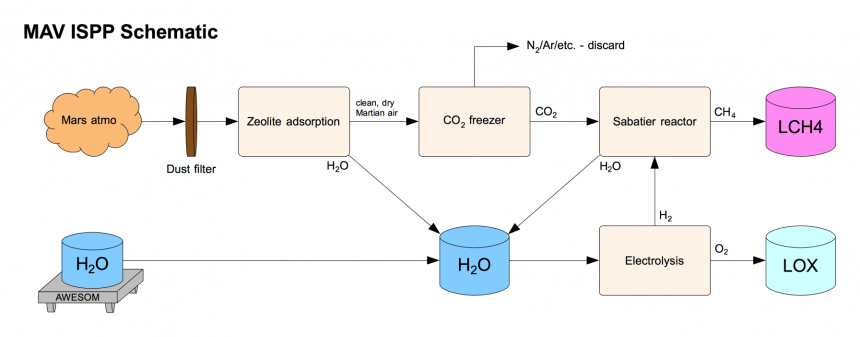
MARCO POLO is a robotic technology demonstration mission comprised of an octagonal lander and mobile robot, which process Martian soil and atmosphere to produce O2, H2O and CH4.
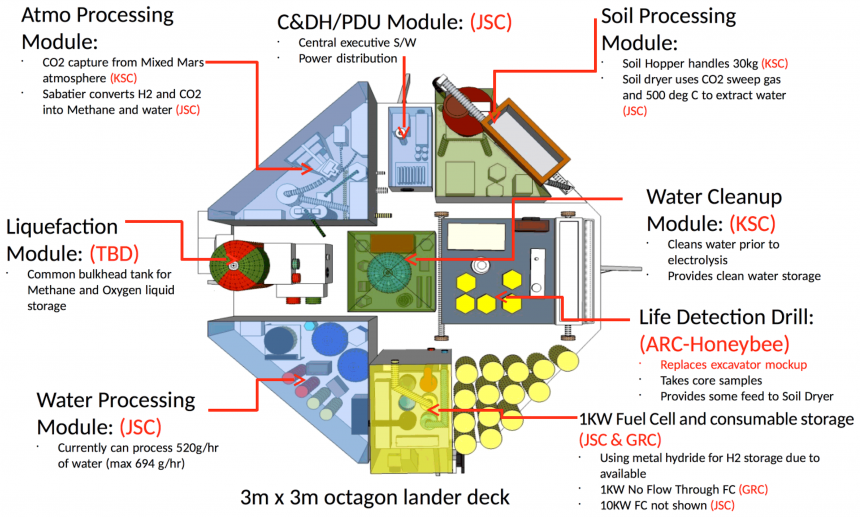
https://ntrs.nasa.gov/archive/nasa/casi … 006401.pdf
Mars Ascent Vehicle Design for Human Exploration
https://esto.nasa.gov/conferences/nstc2 … 7-0015.pdf
Pump Fed Propulsion for Mars Ascent and Other Challenging Maneuvers
www.seas.upenn.edu/~utopcu/pubs/TCM-space07.pdf
Minimum-Fuel Powered Descent for Mars Pinpoint Landing
Still wondering if this is still happening or are they testing another manner....for Nasa....
Offline
Like button can go here
#2 2019-01-13 14:26:31
- SpaceNut
- Administrator
- From: New Hampshire
- Registered: 2004-07-22
- Posts: 29,920
Re: MARCO POLO/Mars Pathfinder
Bump, time to put all of the topic links into this so as to have a common point to link back too and wondering when Nasa is going to start moving on this point as its required for the ability for man to stay in order to explore.
Offline
Like button can go here
#3 2019-01-13 15:06:14
- SpaceNut
- Administrator
- From: New Hampshire
- Registered: 2004-07-22
- Posts: 29,920
Re: MARCO POLO/Mars Pathfinder
Listing of CO2 from collection to what we can do once we have it:
Chemicals centre on Mars
Mars Insitu Fuels made from atmosphere, regolith, water
Getting air on Mars
Atmospheric Separations
Carbon Monoxide - a way to power Mars?
Compressed gas energy storage.
CO2 Sublimation Heat Engine
Evaporation energy
Mars Atmospheric Kinetic Engine
A mission to Mars could make its own oxygen with plasma technology
Carbon and Carbon Monoxide
Another Power System on Mars... - Bio-Generator
Offline
Like button can go here
#4 2019-01-13 15:38:53
- Void
- Member
- Registered: 2011-12-29
- Posts: 9,083
Re: MARCO POLO/Mars Pathfinder
Well, since you are home stranded, I presume, here is some material which might entertain you.
https://phys.org/news/2019-01-steam-pro … plore.html
Quote:
Steam-propelled spacecraft prototype can theoretically explore celestial objects "forever"
Does not appear that the craft could take off from Mars, but the techniques might be useful on Mars.
The company mentioned:
https://www.honeybeerobotics.com/
Space:
https://www.honeybeerobotics.com/servic … 0507812500
Mining, Oil, & Gas:
https://www.honeybeerobotics.com/servic … g-oil-gas/
And of course there are hints that water exists in significance near the equator of Mars, either as Ice or Hydrated Salts/Minerals. According to this article:
https://www.space.com/38330-water-ice-m … uator.html
If SpaceX does its optimal potential, I would presume these things would be checked out within 5-10 years.
It would be very nice to locate at the most optimal place on Mars, perhaps even the equator, if the article is right.
Done.
Last edited by Void (2019-01-13 15:47:54)
Is it possible that the root of political science claims is to produce white collar jobs for people who paid for an education and do not want a real job?
Offline
Like button can go here
#5 2019-01-13 15:49:08
- SpaceNut
- Administrator
- From: New Hampshire
- Registered: 2004-07-22
- Posts: 29,920
Re: MARCO POLO/Mars Pathfinder
Listing of CH4 topics that relate to capture and uses: Sabatier
Researchers invent novel catalyst to convert carbon dioxide
Solar induced hydrocarbon goop on Mars.
Seasonal Methane on Mars
Methane on Mars - Proof for life on Mars?
Power Distribution by pipelines on Mars.
Mobile Energy Storage in a Mars Colony
Offline
Like button can go here
#6 2019-01-22 21:31:36
- SpaceNut
- Administrator
- From: New Hampshire
- Registered: 2004-07-22
- Posts: 29,920
Re: MARCO POLO/Mars Pathfinder
http://www.marspapers.org/paper/Zubrin_1997.pdf
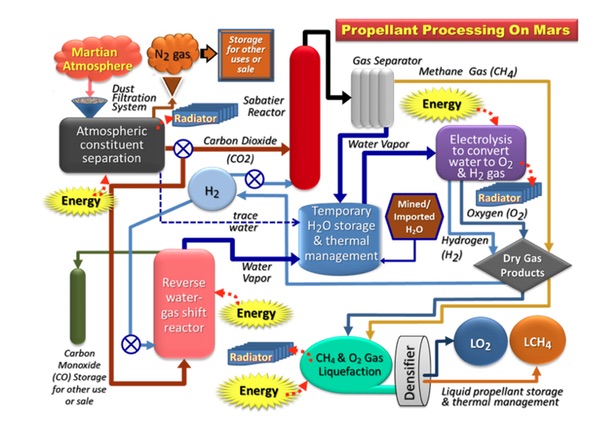
Engineering Mars commercial rocket propellant production for the Big Falcon Rocket (part 1)
Engineering Mars commercial rocket propellant production for the Big Falcon Rocket (part 2)
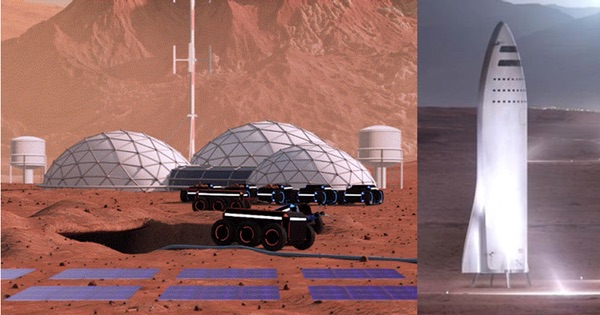
Water harvesting
ISRU review, the NASA study four-kilowatt-hour figure was used for the power estimates used by robotic water extraction/mining unit operations. Including the power needs to then load the water ore and transport this water ore feedstock adds another 25 percent to this number, for a total of five kilowatt-hours to mine 4,150 kilograms of water ore. The 7.5-kilowatt-hour examples from the NASA study were then used for power estimates of the separation and vitalization processing to produce 33 kilograms of refined pure quality water from the mined Martian water-bearing regolith ore. This gives an energy cost of extracting and processing (with an overhead factor) to produce purified water from Martian raw ore materials at an estimate of about 230 watts per kilogram.
Water Electrolysis
The water electrolysis processing is highly power intensive because of the energy of the bond strength between the hydrogen and oxygen atoms. The electrolysis of water requires a minimum of 237.13 kilojoules of electrical energy input to dissociate each mole of liquid water. Each mole of water gives you 2 grams of hydrogen and 16 grams of oxygen gases. Put another way, commercially available electrolysis systems require about 50 kilowatt-hours of power to produce one kilogram of hydrogen and eight kilograms of oxygen gas from nine kilograms of liquid water.
Sabatier Reaction
hydrogen is through the electrolysis of the water by-product that results from the Sabatier reactor. Unfortunately, for every 44 kilograms of carbon dioxide that is converted into 16 kilograms of methane in the Sabatier process, you need four kilograms of hydrogen. The Sabatier process only produces 36 kilograms of water in the balanced reaction. An optimized system of this design massing 50 kilograms “has been projected to produce 1 kg/day of O2:CH4 propellant… with a methane purity of 98+% while consuming 700 Watts of electrical power.”
RWGS reaction
RWGS reactor compliment to the primary Sabatier process. This RWGS reactor uses additional carbon dioxide feed stock extracted from the Martian atmosphere and hydrogen gas to produce additional water and a carbon monoxide byproduct. one kilogram of carbon dioxide and hydrogen give you 0.3 kilograms of water.
Then we have the energy needs for cooling and compression for many of the steps.
Offline
Like button can go here
#7 2019-10-24 17:31:22
- SpaceNut
- Administrator
- From: New Hampshire
- Registered: 2004-07-22
- Posts: 29,920
Re: MARCO POLO/Mars Pathfinder
bump
what was the numbers on this design...
if its 2 tonnes then maybe we can do a design along those lines of payload for all the parts that we need for a mission of just 2.
The atmosphere of Mars is the layer of gases surrounding Mars. The atmospheric pressure on the Martian surface averages 600 pascals (0.087 psi), about 0.6% of Earth's mean sea level pressure of 101.3 kilopascals (14.69 psi)...
..
Offline
Like button can go here
#8 2019-12-29 20:20:57
- SpaceNut
- Administrator
- From: New Hampshire
- Registered: 2004-07-22
- Posts: 29,920
Re: MARCO POLO/Mars Pathfinder
Looks as if nasa is trying to make a sample return mission
RASSOR, MARCO POLO Demonstrate Resource Utilization on Mars
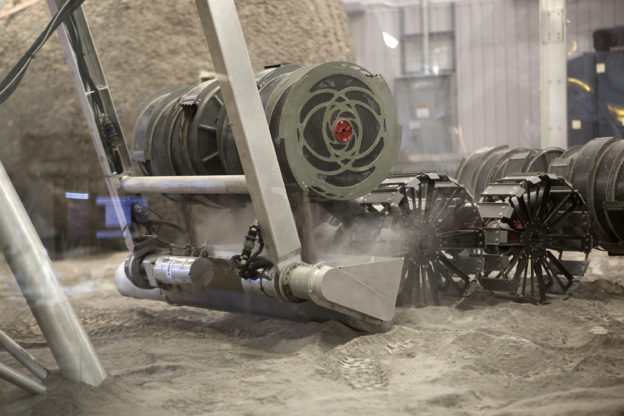
Regolith Advanced Surface Systems Operations Robot. RASSOR excavated regolith and delivered sand and gravel to a hopper and mock oven.
http://canada.marssociety.org/winnipeg/ … esting.doc
Offline
Like button can go here
#9 2020-01-01 22:00:31
- SpaceNut
- Administrator
- From: New Hampshire
- Registered: 2004-07-22
- Posts: 29,920
Re: MARCO POLO/Mars Pathfinder
updating topic
The freezing of co2 has been meantioned before in
http://newmars.com/forums/viewtopic.php?id=6826&p=12 at post 278
http://newmars.com/forums/viewtopic.php?id=7316&p=2 at post 36https://isru.nasa.gov/CarbonDioxideOxygen.html
It is part of the MARCO POLO/Mars ISRU Pathfinder Project.
https://sciences.ucf.edu/class/wp-conte … o-JoAE.pdf
This is the webview https://view.officeapps.live.com/op/vie … esting.doc
http://canada.marssociety.org/winnipeg/ … esting.doc
Sabatier test stand
https://image.slidesharecdn.com/earthan … 1422583549https://ntrs.nasa.gov/archive/nasa/casi … 001808.pdf
Mars Atmospheric Capture [and Processing]
For SpaceNut re #721 and references to scroll pump ...
The link you provided to the NASA site came up with a powerpoint dated 2017, with a number of references to work by Dr. Zubrin and associates.
The technology of a "scroll pump" is new to me. Someone might be interested in the page at Wikipedia:
https://en.wikipedia.org/wiki/Scroll_compressor
In the NASA powerpoint, only two stages of compression are shown, moving from Mars atmosphere to input to the Sabatier reaction.
(th)
NASA SBIR - 1998 (abstract only): Mars Atmospheric Carbon Dioxide Freezer
NASA Technical Report Server (NTRS) - 2012: Mars In Situ Resource Utilization Technology Evaluation
We have examined the technologies required to enable Mars In-Situ Resource Utilization
(ISRU) because our understanding of Mars resources has changed significantly in the last
five years as a result of recent robotic missions to the red planet. Two major developments,
(1) confirmation of the presence of near-surface water in the form of ice in very large
amounts at high latitudes by the Phoenix Lander and (2) the likely existence of water at
lower latitudes in the form of hydrates or ice in the top one meter of the regolith, have the
potential to change ISRU technology selection. A brief technology assessment was performed
for the most promising Mars atmospheric gas processing techniques: Reverse Water Gas
Shift (RWGS) and Methanation (aka Sabatier), as well as an overview of soil processing
technology to extract water from Martian soil.NASA NTRS - 2011: Evaluation of Mars CO2 Capture and Gas Separation Technologies
NASA NTRS - 2017 (slides): The Technology and Future of In-Situ Resource Utilization (ISRU)
Offline
Like button can go here
#10 2020-01-11 12:19:55
- SpaceNut
- Administrator
- From: New Hampshire
- Registered: 2004-07-22
- Posts: 29,920
Re: MARCO POLO/Mars Pathfinder
Getting water so far is excavating regolith as we search for it underground. The concentration is a cup for a meter any where from an inch to several feet below the surface.
As part of the process designs are maturing so as to be able to get the water at the lowest energy cost possible.
Part of the system for processing the water and co2 is getting that water.
Pioneering Space Requires Living Off the Land in the Solar System

RASSOR 2.0, the Regolith Advanced Surface Systems Operations Robot. RASSOR excavated regolith and delivered sand and gravel to a hopper and mock oven.
Making about two pounds of fuel on Mars saves about 500 pounds launching it from Earth to get it to the Red Planet.
http://www.nasa.gov/feature/nasas-explo … f-the-land
http://www.marspapers.org/paper/Muscate … 3_pres.pdf
Atmospheric Processing Module for Mars Propellant Production
https://pdfs.semanticscholar.org/f060/2 … 13167b.pdf
Prototype Development of an Integrated Mars Atmosphere & Soil Processing System
Offline
Like button can go here
#11 2020-01-11 15:28:27
- SpaceNut
- Administrator
- From: New Hampshire
- Registered: 2004-07-22
- Posts: 29,920
Offline
Like button can go here
#12 2021-10-11 16:21:21
- SpaceNut
- Administrator
- From: New Hampshire
- Registered: 2004-07-22
- Posts: 29,920
Re: MARCO POLO/Mars Pathfinder
Topic has been idle for quite some time.
But is a demonstrator that we are not hearing anything about.
Offline
Like button can go here
#13 2024-05-30 19:26:04
- SpaceNut
- Administrator
- From: New Hampshire
- Registered: 2004-07-22
- Posts: 29,920
Re: MARCO POLO/Mars Pathfinder
Seems that the lander was dropped and only lab equipment development was to be done as indicate in one of the pdf files 2012....
Offline
Like button can go here
#14 2024-05-30 19:48:28
- tahanson43206
- Moderator
- Registered: 2018-04-27
- Posts: 23,468
Re: MARCO POLO/Mars Pathfinder
For SpaceNut .... there's a link in the document, and it no longer works.
That was quite an ambitious concept, and the presentation shows a ** lot ** of time, money and energy was put into it.
My guess is that the mission objectives were moved into other projects that did fly.
For example, the experiment to make oxygen was flown and it appears to have been a success.
For all .. if one of our members has time and the subject is interesting, please find out what happened to this project and it's people.
(th)
Offline
Like button can go here
Pages: 1
